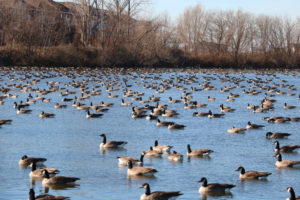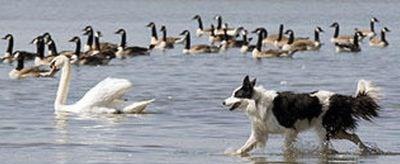Most of the excess phosphorus entering Swan Lake is attributed to Canada Geese with only 30% -50% coming from runoff from adjacent areas and stormwater. Staff has conclude that there is little that can be done to reduce stormwater and park runoff so the focus is on what, if anything, can be done to reduce the contribution by Canada Geese.
For the past 5 years Markham has engaged a service for scaring away geese (called “hazing”) in the spring, summer and fall plus a springtime egg oiling program. Following consultation with a goose management expert at the TRCA, in August, Markham staff proposed an enhanced program, including a plan to relocate geese from Swan Lake Park.
Spring and Early Summer Program
In early spring flocks of migrating geese stop at Swan Lake on their way to their northern nesting areas. They tend to stay for only short rest periods before heading north so their numbers and the impact are not as great. Some of the techniques planned for the fall program could be applied in the spring as well but are not seen as cost effective.
Geese that come to spend their summers at Swan Lake account for 25% of the phosphorus problem but have the largest impact on the community’s ability to enjoy the park.
The program to oil the eggs will continue and an effort will be made to round up and relocate any adult birds that come here to molt. This can only be done during the period when they are flightless – usually in June. Unfortunately, it is not safe to transport the young goslings so those that successfully nest will not be relocated.
The TRCA has had success relocating geese from other local municipalities to sanctuaries in Southern Ontario and recommends the $10,000 annual program for Swan Lake Park.
Fall Migration Program

Photo courtesy of Don Fowler
In late October and through November large flocks stop over at Swan Lake on their route south. They are returning with their young so they come in greater numbers. If the weather is good and food plentiful they will stay for extended periods. Daily counts of over 1,000 are common. Almost 70% of the geese phosphorus problem is related to the fall migration — it is also the most challenging one to address.
A harassment program has been used for a while but the intensity will be increased under a more frequent schedule. The primary drawback – these approaches are very labour intensive. They work as long as there is someone on the shoreline, once they leave, many of the geese return. Concerned that the proposed daily hazing program may not be effective, the Friends of Swan Lake Park proposed a two year trial of “Perpetual Harassment” by adding floating strobe lights on the water to reinforce the hazing efforts. The strobe lights, which cost $5,000, are active all night so provide a constant disruption throughout the night.
Trial Approved for Fall of 2020
On August 14, the Markham Subcommittee of Council agreed to recommend to Council, for approval in September, the proposed Perpetual Hazing trial program for 2020 which will have a one-time cost of approximately $15,000 plus approval for increasing the annual goose management program from $14,000 to $21,000 – primarily due to the addition the annual relocation program.
The Friends of Swan Lake have agreed to support the fall hazing program and a more concerted effort to tally the visiting geese.
As we know Swan Lake is an attractive place. The goal is to reduce the impact of migrating geese by 25% – there is no obvious way to totally stop geese from coming to enjoy our lake.
Volunteers Needed!
We are looking for volunteers to support the geese counting effort this fall. If you are interested in helping, please email friends@friendsofswanlakepark.ca.


